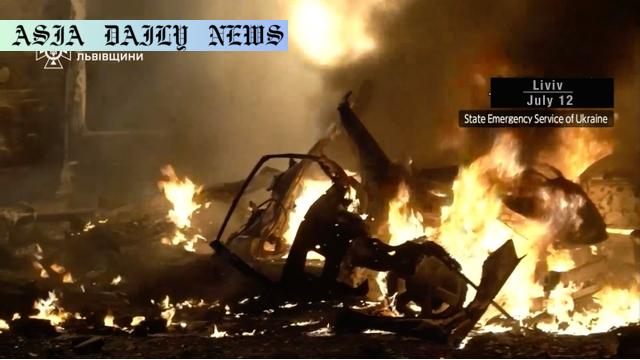Russian drones devastate Ukraine, causing deaths and injuries in a mass attack

Escalation of Drone Attacks in Ukraine
Russian forces have dramatically increased their drone and missile attacks on Ukraine, leaving a deep trail of devastation in their wake. Reports confirm that over a period through Saturday, Russia utilized 600 drones and 26 cruise missiles to wreak havoc on Ukrainian cities. Ukrainian President Volodymyr Zelenskyy revealed in a social media statement that more than 20 missiles and a substantial majority of these drones were intercepted. Despite their efforts, the human and material toll remains significant.
The raids have heavily impacted western Ukrainian cities such as Chernivtsi, Lviv, and Lutsk. In Chernivtsi, at least two individuals lost their lives due to falling debris, while similar destruction in Lviv left 10 injured and buildings, including a university, significantly damaged. The intensity and frequency of these attacks have escalated since last month, with 700 drones reportedly launched in the days leading up to last Wednesday. This increase marks the highest rate of drone attacks since the initial invasion by Russia.
Western Response Amid Crisis
The escalation comes at a politically sensitive time, as the United States momentarily suspended weapons supply to Ukraine. However, President Zelenskyy remains optimistic, reporting positive signals from the U.S. and European allies. The pause in American military aid has heightened concerns among Ukrainian supporters, but Zelenskyy has assured that most aid shipments have resumed according to recent updates. This reassurance provides much-needed solace amid the continued onslaught of aggression faced by Ukraine.
In the wake of these attacks, Ukrainian Foreign Minister Andrii Sybiha highlighted on social media the specific toll exacted on cities like Lutsk, Chernivtsi, and Lviv. Efforts to resist these assaults have been commendable, with Ukrainian defenders showcasing resilience in intercepting the majority of attacks. Still, the strikes underscore the urgency for stronger international support and diplomatic efforts aimed at curtailing Russia’s aggression.
The Humanitarian Toll and Moving Forward
While world leaders deliberate on strategic responses, the humanitarian impact of these attacks persists. Families in cities like Chernivtsi mourn their loved ones, while countless others struggle to rebuild their homes. The attack on the university in Lviv symbolizes the broader damage inflicted on Ukraine’s educational and cultural institutions, highlighting the long-term societal repercussions of this ongoing conflict.
Meanwhile, global solidarity remains critical in these trying times. Reassurances of support from allies like the U.S. and European nations provide hope, but the crisis demands a coordinated, robust response. As the situation unfolds, ensuring the safety and dignity of Ukrainian citizens remains a paramount priority.
Commentary
Condemning Aggression: The Need for a Just Resolution
The recent drone attacks on Ukrainian cities are a chilling reminder of the human cost of prolonged conflict. With hundreds of drones and missiles unleashed, the devastation is staggering, leaving citizens to grapple with loss, injury, and widespread destruction. The international community has long acknowledged Ukraine’s plight, but these recent events underscore an urgent need for renewed support and action.
The Resilience of Ukraine Amid Challenges
What stands out in this grim narrative is the resilience of the Ukrainian people and leadership. Despite escalating aggression and mounting obstacles, their determination shines through in their ability to intercept most of the drones and endure ongoing hardships. President Zelenskyy’s unwavering resolve to secure aid and foster solidarity with key allies reflects the strength of Ukraine’s resolve in this conflict. This perseverance, however, should not be mistaken as a reason to delay more comprehensive interventions.
The Role of Global Solidarity
Global leaders must recognize that Ukraine’s struggle against aggression is not theirs alone. It represents a broader fight against violations of sovereignty and peaceful coexistence. While military aid and humanitarian assistance are crucial, long-term peace will require diplomatic negotiations, sanctions, and a concerted effort to hold those responsible for aggression accountable. Standing with Ukraine is not just a political or military necessity; it is a moral imperative.
The unfolding situation calls for global attention and proactive measures. Addressing the humanitarian needs of the affected population, alongside strategizing a path toward sustainable peace, is crucial. As the world watches, let this be a moment where unity and resolve triumph in the face of adversity.


